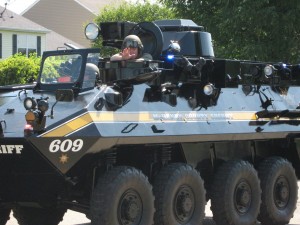The morning of September 11, 2001 I showed up to work to find out that “we were being attacked.” Not being sure what that meant, I did exactly what I do- grabbed my files and went to court. When I walked into the courtroom the details were still fuzzy. It wasn’t until after I finished a morning of helping the misguided youth of juvenile court that I figured it out. Despite my insistence at that time that I was not willing to let 9/11 affect my daily life, change under the guise of “increased security” was foisted upon me.
When will we ask if it was worth it?
Some of that change was small and innocuous. The McHenry County Courthouse put up a small landscape barrier outside the courthouse so, presumably, nobody could drive a truck into the first floor. Lawyers previously given a pass through security at some courthouses were required to undertake the same security measures as the general public. Airline baggage checks were required to ask us if our bags had been out of our site. Banks were required to report a wider range of transactions to the federal government.
Other changes were not. Nearly every courthouse got newer, “better” metal detectors and beefed up security. We were told by the appeals courts that “in this age of routine, soon to be universal” that “reasonable” security measures in the new era may not be more intense than what was reasonable before 9/11. (see U.S. v. Allman, 336 F.3d 555, 557-558, 7th Cir 2003, “If anything, it was irresponsible of the postal authorities to ship the box to Chicago without first x-raying it.”) Even the McHenry County Sheriff’s office secured an intimidating, expensive armored personell carrier.
A lot has happened in the last decade. Terror levels have risen and fallen. Security measures have continued to increase. Courts have seemingly expanded the spectrum of “reasonable” searches based on our new experiences. The economy has tumbled. Bin Laden has died.
Nearly ten years after I was wary of the impending reaction to the 9/11 tragedy, my reservation has morphed to frustration. The economy is horrible. Even locally, it looks like millions of dollars have gone into increased security measures. When will it be time to ask if those dollars are doing what lawmakers think?
I am not saying that increased security measures were un-necessary. Or that increased airport security is bad. Or that any security increases have been bad.
What I am saying is this:
My “everyday” life is affected by the post-9/11 security measures. I pass through security 8-15 times per week at any one of a dozen courthouses I regularly visit. All of them have different security measure in place. Most of them have, presumably, received more modern equipment or better services since 9/11. Many of them are now staffed with more people.
Ask any lawyer who regularly goes to different courthouses if some are safer than others. You’ll probably get a chuckle followed by a rank-ordered list of courthouses that do not quite seem to be as secure as they look. You will probably also get a list of suggestions on how to remedy that. Many of those suggestions will cost less and be more effective than new body scanners, or whatever else is en vogue with the sales staff at security firms. Metal detectors are rarely the weakest link.
We’ve spent a lot of money on increasing security at the courthouses in the last ten years. Presumably, the increased spending has lead to increased security. At least I get the impression the “spending” authorities feel that way. Despite all of the spending, it sure appears that some of the courthouses are no more secure than they were before 9/11.
It’s well past time we explore that presumption, and spend on measures that actually increase security. Every dollar spent which fails in its effort to make a courthouse more secure is money wasted. Some money we’ve spent has been wasteful. Answering the questions of “Which money?” and “How much?” might be a first step ushering in a more efficient, more secure, post-Bin Laden era.
Until then, we live in a state of denial over how effective our security spending has been.

